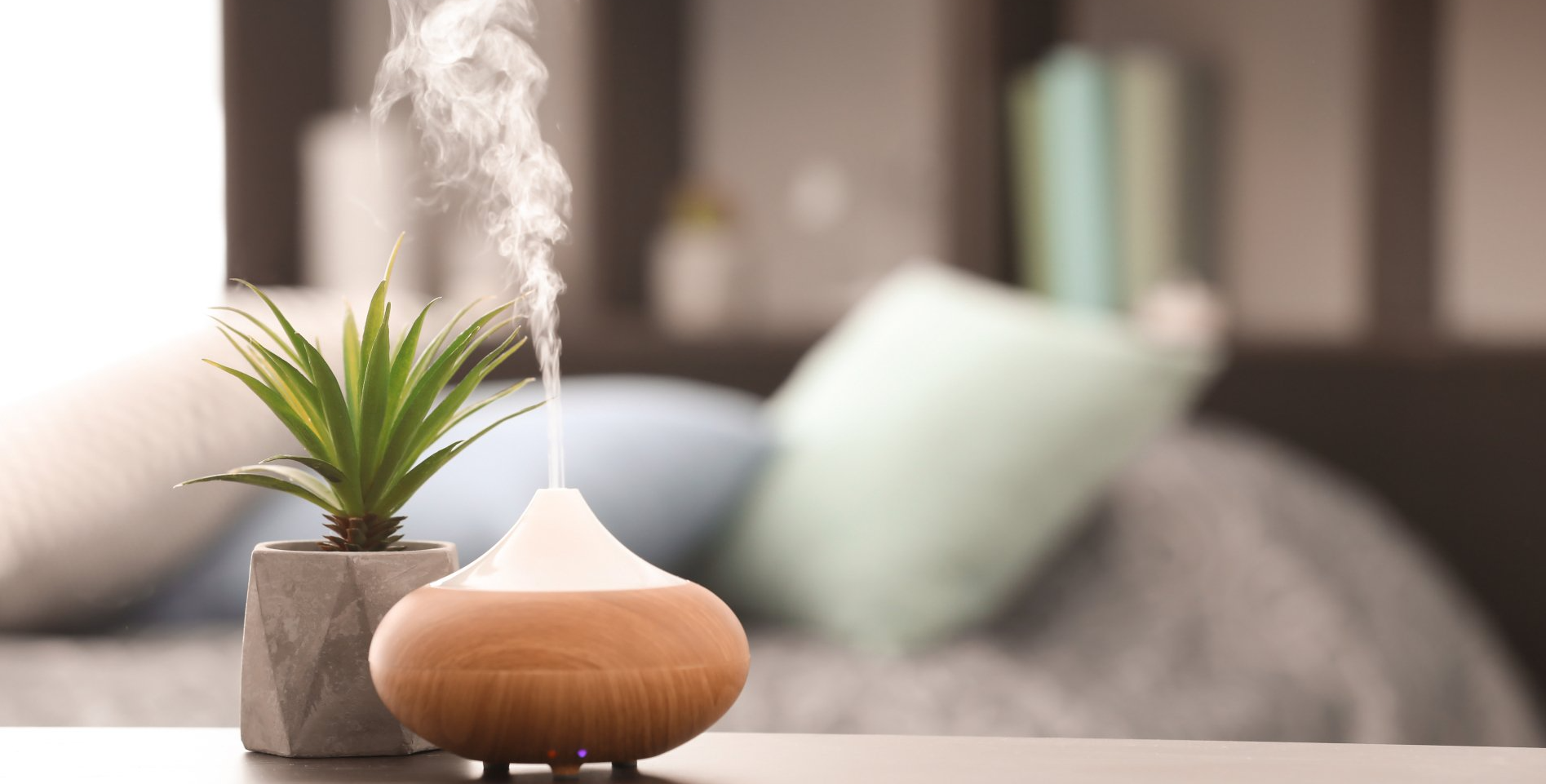What Are the Advantages of Having a Humidifier in Your House?
You may notice that the air in your home is dry during the cold winter months (or in the summer when your air conditioner is turned on). Dry air can irritate the nose and eyes in otherwise healthy people, just like overly humid air can be harmful to your health. If the air in your home is excessively dry, one approach is to use a humidifier. You'll discover how humidifiers operate, the advantages of having one in your house, and how to pick the proper one and use it correctly in the sections below.

Humidity levels and health benefit
Extremely dry or humid air can have a negative impact on your health and the condition of your home. When the air is overly humid, it encourages mold and mildew growth, which can lead to health problems as well as property damage. If you have asthma or another respiratory condition, dry air might aggravate your symptoms.
During cold winter months (or in the heat of the summer when your AC is on), you may notice that the air in your home is dry. Just like very humid air could be bad news for your health, dry air may cause nose and eye irritation in otherwise healthy people. One solution is to use a humidifier if the air in your home is too dry. Below, you will learn how humidifiers work, the benefits of using one in your home, and how to choose the right one and use it correctly.
The dry air may cause problems including:
● Dry eyes
● Sore throat
● Dry nasal passages
● Bloody nose
● Make colds and flus worse
● Chapped skin and lips
● Itchy, dry skin
● Worsened asthma and allergy symptoms
Many of these health problems can be alleviated by keeping your home's air from getting too dry. Controlling indoor humidity might be difficult depending on where you live. A humidifier can help in this situation. It's important to keep the humidity in your home at a comfortable level–not too high or too low. The Environmental Protection Agency (EPA) recommends maintaining a humidity level of 30 to 50 percent in your house.
5 Benefits of using a humidifier during sleep
Adults and children may benefit from the use of humidifiers while sleeping. Our immune system is aided by sleep in terms of repair, renewal, and maintenance. Adding a humidifier to your bedroom can help to enhance the benefits of sleeping. The following are some of the advantages of sleeping with a humidifier in your room.
Air that isn't too dry may aid in the prevention of colds and flu: Colds and flu viruses can make you feel horrible and disrupt your sleep. They may appear to pass from person to person without slowing down throughout the cold months. Fortunately, air with an acceptable humidity level that is not too dry may reduce the infectivity of airborne viruses. According to research, a humidity level of 40% or above reduced the infectivity of the influenza virus by roughly 14%. Nearly 75% of the virus preserved infectivity when the humidity was less than 23%. (Noti et al., 2013). Viruses have a better chance of sticking to water vapor droplets and falling out of the air when the humidity is higher, rather than clinging to us and infecting us directly. This explains why the dry winter climate can make us more vulnerable to sickness. Sleep deprivation has been connected to human immune systems, notably in suppressing immunological activity, such as raising inflammation and diminishing antibody response to Hepatitis A and influenza vaccines, according to research.
Higher humidity may help loosen congestion: Mucus can become dry and thick as a result of dry air, resulting in clogged nasal passages. As a result, a stuffy nose, sore throat, and sinus pain may occur. Humidifiers can aid by adding moisture to the environment, which can help break up phlegm in the nose and chest.
Cold and flu symptoms may be alleviated: If you do get the flu or a cold, using a humidifier while you sleep may help you recover faster. In addition to loosening congestion, it may help lubricate your nasal passages, allowing you to breathe a lot easier. This may also help alleviate a sore throat and, for some people, sinus headaches, and restore a restful sleep. Moreover, cold and fever symptoms could be worse at night as lying down puts you in a compromised position. Cold, dry air, in addition to a prone sleeping posture can affect how mucus builds up in the nasal cavity and the lack of adequate draining while lying down can create that mucus build up and exacerbate cold and flu symptoms. A humidifier may help alleviate this by adding more moisture to the air.
Moist air may help prevent dry skin: Dry air may cause dry skin. When your skin is dry, it may crack and wrinkle more easily. This can be incredibly uncomfortable. Unfortunately, when you have dry air in your home, using lotion and chapstick may not be enough to rehydrate skin. One way to help is to have acceptable levels of moisture in the air, so your skin can absorb it. Skin-related conditions that cause itchy skin such as eczema can disturb sleep. The National Eczema Association states that a damaged skin barrier coupled with uneven humidity levels can exacerbate these symptoms. A humidifier, along with creams, may help sufferers retain skin moisture, reduce scratching, and promote uninterrupted sleep.
It can help keep your hair and scalp healthy: Just like the skin on the rest of your body, your scalp may become dry and irritated when there is a lack of moisture in the air. This may cause your scalp to itch and worsen dandruff. Your hair may be affected, too. Since it is made up of collagen, your hair needs a certain amount of moisture. When exposed to dry air for too long, your hair might become dry and brittle. Acceptable levels of humidity may help with this.
Benefits of a humidifier for snoring and sleep apnea
Humidifiers can help with dry airways, which can lead to snoring. Snoring is caused by a narrowed airway, which causes a dry mouth and relaxed throat. Because of the dryness, the respiratory airways overcompensate by creating more mucus, resulting in constriction and the chance of uttering an audible vibration like snoring. Snoring can be helped by addressing the reasons for snoring, such as dry airways.
Snoring on a regular basis could suggest an underlying issue such as sleep apnea. In the most severe situations, this breathing issue would be addressed with the use of a CPAP machine. Those who suffer from snoring or sleep apnea may benefit from adding a humidifier to their CPAP therapy. The American Sleep Apnea Association recommends combining CPAP with heated humidification (HH) to alleviate some of the CPAP's drawbacks. HH, on the other hand, does not appear to influence CPAP users to continue using CPAP or to improve sleep quality, although it does improve naso-pharyngeal discomfort, according to study. Because the nasopharynx is part of our respiratory system's nasal cavity, symptoms like lymph node swelling or any other obstruction in this area can induce snoring. A heated humidifier may be beneficial to those who snore due to a naso-pharngeal condition.
Too much humidity can disturb sleep
According to NASA research, the ideal humidity level for a good night's sleep is between 50 and 60%. (Flynn-Evans, Caddick & Gregory, 2016). While there are certain advantages to using a humidifier while sleeping, excessive use might disrupt sleep patterns. High humidity, for example, influences our sense of an enclosed room's temperature; the more the humidity, the hotter the room feels to us. In contrast, if both humidity and heat levels are high, the sweat response is disturbed, inhibiting the natural cooling comfort of sweating. This can reduce REM sleep and keep you awake.
Humidifier benefits for babies and children
Dry air can be harmful to newborns and young children's health. Using a humidifier can assist in maintaining optimum moisture levels in the air. The following are the key advantages of utilizing a humidifier for babies and children:
Potentially protects their sensitive skin from becoming too dry: When the air is dry, a baby or young child's skin may become dry, irritated, and chapped. Eczema and other chronic skin problems may be aggravated by it. Increasing the amount of moisture in the air could help your child's skin stay hydrated.
Could help them breathe easier: Children may struggle to obtain a good night's sleep due to stuffy noses and coughing. A decent humidifier can help keep your child's nasal passages clear by keeping the air in their room wet. It may also aid in the relief of congestion. Of course, your child does not need to be unwell or suffer from dry skin to benefit from using a humidifier. In the correct levels, moist air may be good for their health and may even help them avoid getting sick.
Other humidifier benefits in your home beyond health
A humidifier may provide benefits to your home, as well.
● Moist air could be good for your houseplants: To survive (and thrive), plants need water from their soil and the air. Dry air may leave your plant shriveled up.
● Humidity may warm up your home’s air, saving you money on utilities: The more humid the air in your home is, the warmer it can feel. In the cold winter months, you probably spend more on heating than you would like. Running a humidifier may cost less than using your heating system and can make the air feel warmer.
● Humid air might reduce static electricity: When the air in your home is dry, you may notice that touching certain fabrics, other people, or your pets can cause a little shock. A little moisture in the air may help alleviate this annoyance.
● Humidifiers may help protect the wood in your home: Wood exposed to dry air may shrink, split, and crack. This is bad news for your wooden furniture, as well as the doors and trim in your home.
Possible benefits of a humidifier in the spring and summer
Depending on where you live, the weather may have an impact on when the air in your home feels dry. For example, if you live somewhere with high levels of outdoor humidity, you probably run your air conditioner a lot in the summer. Air conditioning may dry out your home’s air. Using a humidifier may help counteract this. If you live somewhere with dry air, a humidifier might be good to use year-round.
Since pollen and mold counts tend to be higher in the spring and summer, using a humidifier in your home may also help keep your sinuses from becoming inflamed.
Which humidifiers to choose?
Humidifiers can be divided into five groups. Each one has a distinct method of operation, but the final result is the same: proper moisture conditions in your home. Your needs will determine which type you should pick. Let's have a look at what's going on.
- Evaporators — This type uses a fan to blow air through a moistened filter. Evaporators are an affordable option but may be problematic if they put too much moisture in the air. Excessive humidity can contribute to mold growth and more problems with dust mites, which can aggravate allergy and asthma symptoms.
- Central humidifier — This type of humidifier is built into your home’s central heating and air conditioning unit. The benefit of this is that it helps with humidity levels throughout your home instead of just one room. It is the most expensive option.
- Impeller humidifier — Rotating disks that run at high speeds expel moisture into the air in the form of a cool mist. These could be more child-friendly since they do not cause burns. Similar to evaporators, overuse may trigger asthma and allergy reactions.
- Ultrasonic humidifier — With both cool and warm mist options available, ultrasonic humidifiers are versatile. These produce a mist with the help of ultrasonic vibrations. They may also be available in varying sizes.
- Steam vaporizer — These humidifiers are the most portable and least expensive you can find. They work by heating water and then cooling it down before pushing it into the air.
Pros and cons of using cool mist or warm mist humidifiers
Humidifiers enhance humidity to a room by releasing either warm or chilly air. Both types may be advantageous, while each has its own set of advantages and disadvantages. Which one you pick may be determined by whether you have children or pets, the size of your living area, and your own preferences.
Some of the benefits and drawbacks of cool mist humidifiers include:
● They use less electricity than warm mist humidifiers.
● They do not contain hot water, which makes them a safer option to use around children.
● They can be noisy since they use fans to propel the water into the air.
● The cool mist can cause the air to feel chill.
The benefits and disadvantages of warm mist humidifiers are:
● They tend to be quieter than cool mist humidifiers.
● The boiling process can help remove water borne mold and bacteria.
● They only work best in small areas.
● They contain boiling water and are a burn hazard.
● The boiling process requires more electricity to use.
● They can be more difficult to clean due to the minerals left behind from boiling the water.
Tips for using a humidifier in your home
When using a humidifier, be sure to follow the manufacturer's instructions. This will not only lengthen the life of your humidifier, but it will also ensure that you and your home benefit from it and are not negatively impacted.
● Use distilled or demineralized water — Tap water can contain minerals that can encourage mold to grow. If possible, use filtered water. This will help ensure your humidifier—and the air you breathe—does not encourage mold or bacteria growth.
● Change the water daily — Standing water can cause mold to grow. Be sure to change the water in your humidifier every day.
● Clean it weekly — Again, bacteria and mold are two things you want to avoid. Wipe down the inside of your humidifier with a disinfectant regularly.
● Change filters regularly — Not all humidifiers have filters but if yours does, make sure to change it as often as recommended by the manufacturer. If you do not change it enough, trapped mold and bacteria may be released into the air– definitely not what you are looking for.
It is undeniable that dry air has a negative impact on your health. Using a humidifier to provide a little moisture to the air can be a simple solution to this problem. Take cautious not to overuse one to the point where moisture levels rise too high, which can lead to mold and dust mite issues. Using an air purifier at the same time can also assist to enhance the quality of the air within your home.






